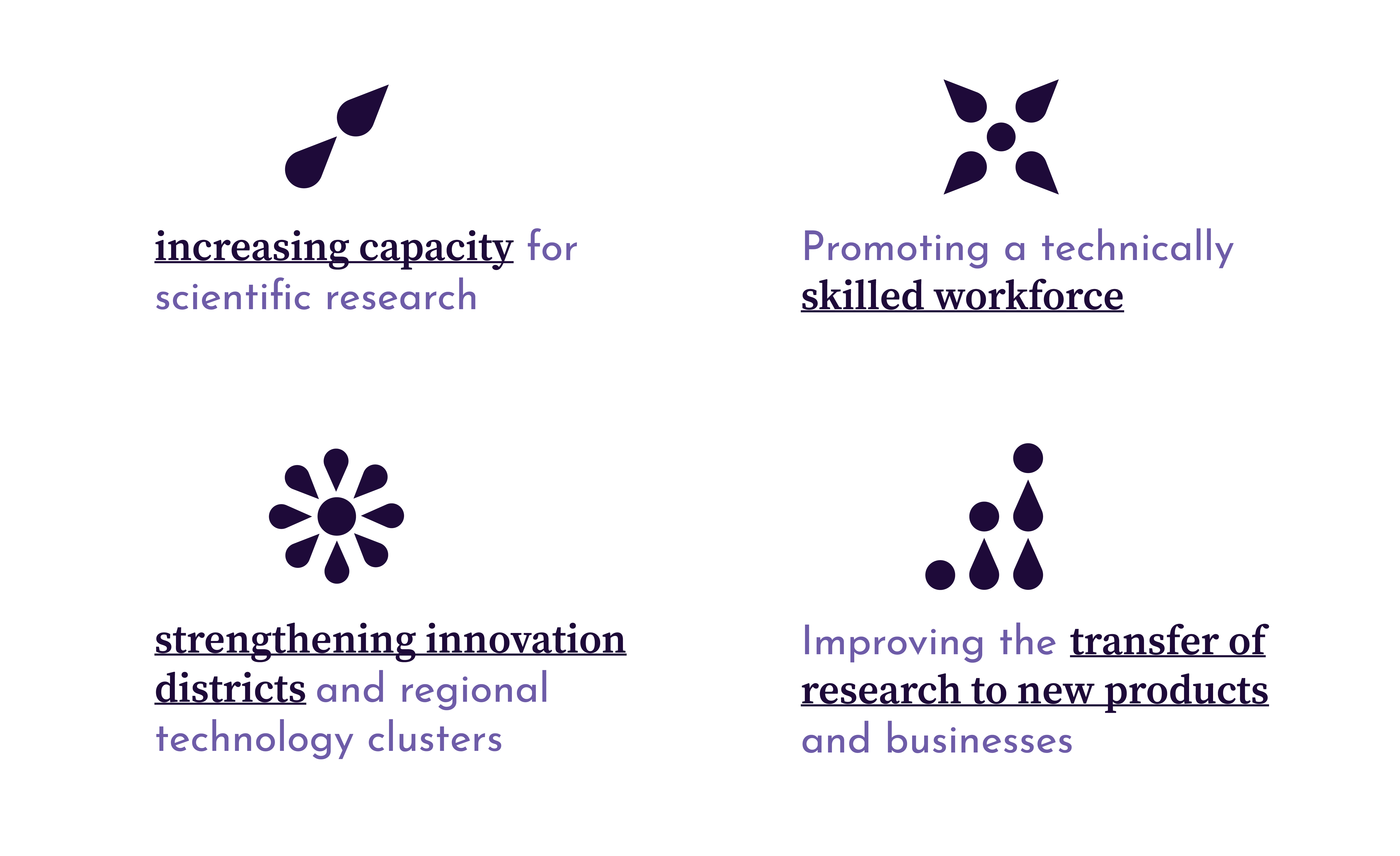
About
We work at the state and federal level to support innovative tech policies and programs, diversify the science and technology industry, and attract research and commercialization dollars to Illinois.
Advocacy Goals

Legislative Highlights
Federal
- Regional Innovation Strategies (RIS) | the EDA’s RIS program was authorized through 2024, received $33M in funding
- Manufacturing | $146M for Manufacturing Extension Partnership (MEP), $16M for Manufacturing USA
- Small Business | $10M in funding towards SBA innovation programs
- Energy | $425M in funding, representing a 15 percent increase, to Advanced Research Projects Agency – Energy (ARPA-E)
- National Science Foundation (NSF) | NSF received $8.3B in funding, including an additional $5M for I-Corps
State
- R&D Tax Credit | R&D tax credit program was extended to 2027, and gives a 6.5 percent tax credit on increases in R&D spending
- Education Funding | Illinois legislature passed bills to increase K-12 funding and increase MAP grant funding to support college students
- Economic Development | Illinois’ new capital bill includes funding for broadband expansion, new innovation spaces, and more
- Apprenticeship Tax credit | employers receive up to $3,500 to cover costs for employee enrollment in apprenticeship programs
- Data Center Tax Incentives | Data centers are exempt from state and sales tax on new machinery if certain requirements are met
Federal Initiatives
Federal Funding Support
Historically, this has included playing a significant role in securing research- and technology-focused federal funding, including the $120 million U.S. Department of Energy’s Joint Center for Energy Storage Research (JCESR) center at Argonne and the U.S. Department of Defence’s $320 million Digital Manufacturing and Design Innovation Institute (DMDII) at UI LABS.
Regional Innovation Strategies (RIS) Program
ISTC has played an integral role in supporting a number of successful applications for the RIS Program, including the Energy Foundry Seed Investor Education and Strategic Partner Development Project, which is helping to expand the pool of available capital that is accessible for energy start-ups and technologists in the Midwest. In addition, ISTC assisted mHub, Chicago’s first innovation center for physical product development and manufacturing, in its successful application for a $500,000 i6 grant through the RIS Program competition in 2016.
Immigration Reform
CHI-BASE NSF Grant
The National Science Foundation (NSF) has launched a competitive call to create Regional Innovation Engines that stimulate regional economic growth through the development of innovation ecosystems, a $160 million, 10-year commitment.
We want the Chicago region to be the exemplar of a Life Science Innovation Ecosystem that works for all, enabling everyone to live their healthiest lives.
As neutral conveners and liaisons to the life science community, Walder Foundation, P33, Chicago Biomedical Consortium (CBC), World Business Chicago (WBC), and the Illinois Science and Technology Coalition (ISTC) submitted a Type II concept outline focused on life sciences and health equity, the CHI-BASE (Collaborative Hub Innovating Biology in Action across Scale and Ecosystem) Engine. NSF has invited us to submit a full proposal, due on January 23, 2023.
In a region and nation plagued with health disparities, a thriving, inclusive life science innovation ecosystem that works for all is an urgent imperative. We believe the Chicago region’s burgeoning life science sector and geographic location in America’s heartland position the CHI-BASE Engine to become an exemplar of an inclusive innovation ecosystem with excellence and equity at its core.
To learn more, join the conversation here.
State Initiatives
State Tax Credits
ISTC supports the use of state-level tax credits to support investment in research and development (R&D) and angel investments. The R&D and Angel Investment Tax Credits have provided a strong return on investment and have been utilized as tool to attract and retain innovation-driven companies and entrepreneurs. Thanks in part to an advocacy partnership between ISTC, the Illinois Biotechnology Innovation Organization (iBIO), and the Illinois Manufacturers’ Association (IMA), both the R&D and Angel Tax Credits were renewed in July of 2017. Read more.
State Capital Investment
Over the last 15 years, the State of Illinois has invested $216 million to support innovation hubs across the state, which has leveraged almost $5.9 billion in additional investment, a 27:1 return on state investment. These innovation hubs connect Illinois’ research, talent and industry to commercialize new technologies that create economic opportunity and solve important challenges in energy, healthcare, agriculture, manufacturing, and other key Illinois industries. State capital support for public-private partnerships with universities and other innovation-driven entities leverages private and federal investments to strengthen the knowledge-based economy across the state.
The ISTC has helped to lay the groundwork for the importance of investing in these innovation hubs that will create companies and jobs and attract top talent – and will continue working with state leaders to support additional capital investment.
